

Irregular Verb Wheel Game - Languages Games. Appositives. What is an appositive?
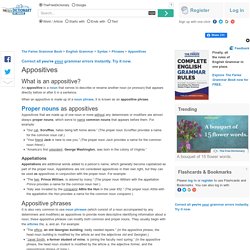
An appositive is a noun that serves to describe or rename another noun (or pronoun) that appears directly before or after it in a sentence. When an appositive is made up of a noun phrase, it is known as an appositive phrase. Proper nouns as appositives Appositives that are made up of one noun or more without any determiners or modifiers are almost always proper nouns, which serve to name common nouns that appears before them. For example: “Our cat, Scruffles, hates being left home alone.” Appellations Appellations are additional words added to a person’s name, which generally become capitalized as part of the proper noun. “The heir, Prince William, is adored by many.”
English grammar guide. Do you have a question about the correct usage of the semicolon or how to place adverbs in a sentence? If so, you've come to the right place. These pages are a complete English grammar guide filled with the rules of English usage. Each grammatical rule is explained in plain English with several examples, and when needed, counter-examples. Difference between ago and before « English Practice – Learn and Practice English Online. English Grammar - Online Grammar and Vocabulary Exercises foe English Language Learners. If only! Conditionals unconditionally.
(Much virtue in “if” – Shakespeare – As you like it) If I ruled the world, every day would be the first day of spring.

If a picture paints a thousand words, then why can’t I paint you? If you can’t stand the heat, get out of the kitchen. If Cleopatra’s nose had been longer, the whole history of the world would have been different. If you know your onions, you’ll never be confused. We’re familiar with our textbook categorisations of conditionals into the zero, first, second and third, as exemplified above. Now, how do you feel about these? Were man but constant, he were perfect. Teaching Tenses to ESL Students. Learn English Grammar with Pictures: 15+ Grammar Topics - ESL Buzz. In this lesson, you will learn English grammar with the following topics: English Grammar Topics WILL – WOULD – SHALL – SHOULDMUCH – MANY – A LOT OF – LITTLE – FEWSOME – ANYComma Rules in EnglishConditional Sentence Type 3English Verb Tenses in One TableBackshift of TensesLooking at the Future from the Past – Which Tense do We Need?
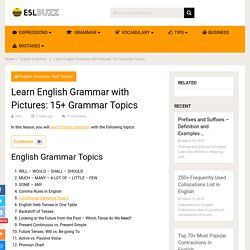
English grammar exercises. ING gerunds vs. infinitive game. ING gerunds vs. infinitive : Practice ING gerunds vs. infinitive using this ESL fun Game.This game is also excellent for classroom teaching.

Teachers can engage students in a classroom vocabulary or grammar review. It is suitable for intermediate and advanced esl learners. It can be used to energize a dull class, to review work that was done or simply as a reward for good classroom work. Introducing Reported Speech Statements,Questions and Orders in a Different Way. This week’s post was not supposed to be a grammar post, it just so happened to turn out like that.

Come to think of it, I have been teaching lots of grammar lately so I shouldn’t be surprised if my brain is filled with ideas for grammar teaching. If I want my classes to be different from the ones I had when I was studying English at school (teacher-centred and book-centred), I cannot introduce all those digital tools I’m so keen on using and then go and spoil it all by asking students to read straight from a photocopy when it comes to grammar.
I’m not saying it’s the wrong way to go about it, I’m just saying it’s not the way I teach or the way I’d like to be taught. Relative Pronouns with comics and jokes: who, which, that, when and where. We use relative clauses to provide more information about a person, a thing or a place.
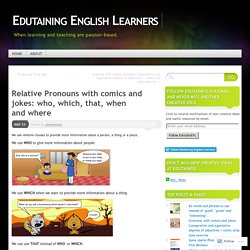
We use WHO to give more information about people. We use WHICH when we want to provide more information about a thing. We can use THAT instead of WHO or WHICH. 24 defining and non-defining relative clause games. 1.
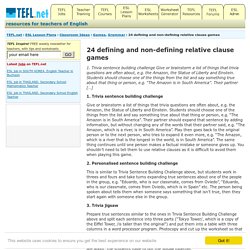
Trivia sentence building challenge Give or brainstorm a list of things that trivia questions are often about, e.g. the Amazon, the Statue of Liberty and Einstein. Students should choose one of the things from the list and say something true about that thing or person, e.g. “The Amazon is in South America”. Their partner […] 1 WORKSHEET – 10 GAMES. Make drilling more meaningful and fun.
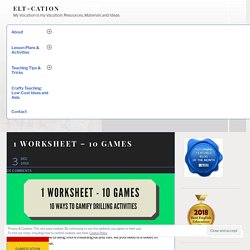
All you need is a sheet of paper. This post shows how the use of game mechanics can help a teacher design better drilling activities and turn repeated practice of target grammar or vocabulary into a cognitively engaging exercise. Focus on the material to be practised and learning outcomes for your group of students: e.g. irregular verbs. Simple grammar rhymes. Beginners have to memorise a lot of new words and grammar.
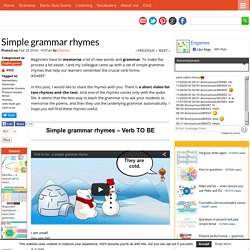
To make the process a bit easier, I and my colleague came up with a set of simple grammar rhymes that help our learners remember the crucial verb forms. ADVERT: In this post, I would like to share the rhymes with you. There is a short video for two rhymes and the text. And one of the rhymes comes only with the audio file. Four speaking activities. In this post, I would like to share four speaking activities that worked very well in my classes.
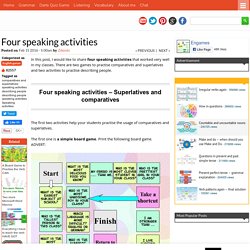
There are two games to practise comparatives and superlatives and two activities to practise describing people. Four speaking activities – Superlatives and comparatives The first two activities help your students practise the usage of comparatives and superlatives. The first one is a simple board game. Print the following board game. Verb master board game. Verb master board game is intended to replace drills. The aim of this game is to help students learn to form verb tenses. While drills are boring, board games are interesting and fun. Thus, students practise the grammar forms and enjoy it. The great advantage of the Verb master game is the fact that the game is nearly universal. Prepositions of direction - learn English,preposition,grammar,english.
Learn English Modal Verbs. Englishmodal verbs are special verbs that are used to show possibility, ability, permission, and so forth. Click Here for Step-by-Step Rules, Stories and Exercises to Practice All English Tenses. Irregular verbs in English - picture rhymes. Irregular verbs in English are forever. No matter how you teach them, the students resist. I have already designed about twelve different ways to teach irregular verbs and my students still struggle. I have tried to teach the verbs in context, through rhymes, straightforward and in songs but to no avail.
However, the last method, using picture rhymes was quite successful, so here I come with another set of 18 irregular verbs. In this post there is the infographic with all the verbs, a simple worksheet and two games to practise the irregular verbs in English. Reported speech and creative writing: Fifty ways – On the same page. Past modals – unfolding mysteries – Mike Astbury – Teaching Games. Three fun grammar activities to encourage teamwork.
English Grammar. Present continuous questions. Present continuous tense is one of the most popular tenses among students. It is easy to form and its usage is crystal clear (at least at the beginning). However, when it comes to forming questions, students often fail. Four speaking activities. Verbs Followed by Gerunds OR Infinitives (Different Usage) A SOME THE ANY AN. When you teach the concept of countability in English, students have to learn to use the words A, SOME, THE, ANY, AN in front of the nouns correctly. Learn English Parts of Speech - Explanations, Examples and Exercises. There are eight different English parts of speech, but before we continue any further... Click Here for Step-by-Step Rules, Stories and Exercises to Practice All English Tenses.
7 grammar myths you learned in school. Mikeastbury.wordpress. English grammar - narrative tenses - ESL activities. Tensemap. Learn the Parts of Speech. 36 fun classroom activities for Present Simple and Continuous. By: Alex Case |Audience: Teachers|Category: Teaching English. Tensemap. Fun 1st Conditional Practice.
Irregular verbs again. In the end vs. at the end, in time vs. on time. Indirect questions: explanation of English grammar. British Council. Grammar videos. Past participle – divided according to the pronunciation ,ENGAMES. Future tenses - will, going to, doing game. HyperGrammar. There are nine parts of speech.